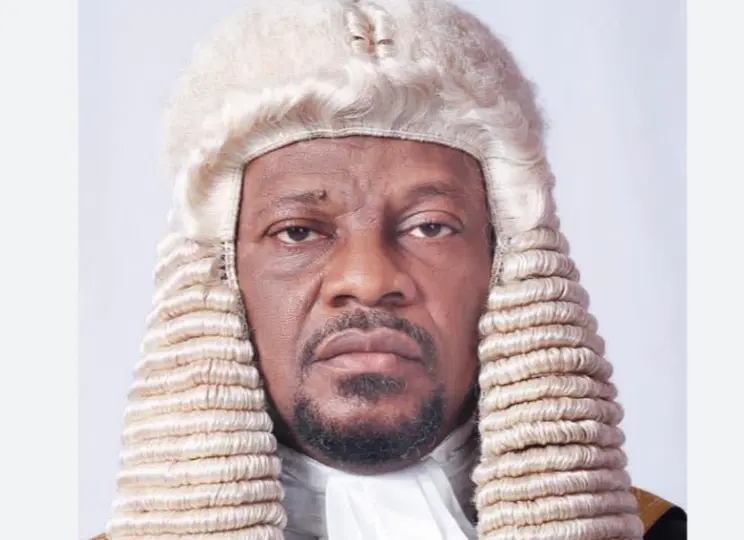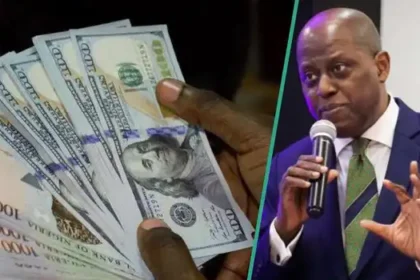Rivers State had been embroiled in political turbulence for nearly two years, owing mostly to a power struggle between Wike and Fubara, which resulted in a prolonged governance crisis.
The Rivers Assembly has launched a probe into state finances during Vice Admiral Ibok-Ete Ibas’ six-month emergency rule
Rivers state received over N254bn from FAAC between March and August 2025, mostly from oil derivation, but failed to publish its 2025 Budget Implementation Report.


However, the immediate past Rivers State Administrator, Vice Admiral Ibok-Ete Ibas (retd.), has rejected a move by the Rivers State House of Assembly to probe the state’s expenditure over the last few months under his administration.
Ibas concluded his role as the administrator of the oil-rich state on September 17, coinciding with the termination of the six-month emergency rule.
This transition followed President Bola Tinubu’s directive for the reinstatement of the suspended state governor, Siminalayi Fubara, along with his deputy and the members of the state House of Assembly, who were instructed to resume their offices from the preceding Thursday.
The Rivers State House of Assembly, presided over by the Speaker, Martin Amaewhule, during its first plenary after the end of emergency rule, said it would investigate the state expenditure during the six months of emergency rule.
According to the resolutions of the House, “To explore the process of knowing what transpired during the emergency rule with regard to spending from the consolidated revenue fund for the award of contracts and other expenditure.”
It was gathered that Rivers State received at least N254.37bn from the Federation Account Allocation Committee between March and August 2025 under the tenure of the sole administrator.
This figure is based on an analysis of FAAC data from the National Bureau of Statistics and other sources.
While the NBS has released official breakdowns up to June, the figures for July and August were collated from documents presented at FAAC meetings obtained
NBS records show Rivers earned N44.66 billion in March, N44.42 billion in April, N42.80 billion in May, and N42.30 billion in June.
According to the papers reviewed, the state received around N38.42 billion in July and N41.76 billion in August.
These raised total net allocations for the six months to N254.37 billion, with a monthly average of N42.40 billion.
If September follows the same pattern, Rivers’ inflows might total about N297 billion in seven months.
However, the pattern of these allocations demonstrates the state’s substantial reliance on the 13% derived from oil revenue.
According to the breakdown, oil extraction accounted for 13% of total income.
Between March and August, Rivers got N133.24 billion in derivation, accounting for approximately 52.4 percent of its FAAC allocations.
The state collected N18.24bn in March, N21.02bn in April, N14.56bn in May, N19.76bn in June, N17.62bn in July, and N16.58 billion in August.
Rivers also benefited from inflows under the Electronic Money Transfer Levy, environmental funds, and exchange gains, which combined to increase its net receipts despite significant deductions.
Despite these significant allocations, Rivers State has yet to release its 2025 Budget Implementation Report, a required document that details revenues, internally produced money, and spending trends.
Residents and civil society have been unable to establish how the billions have been spent on capital projects, salaries, pensions, or recurring costs because this report has not been released.
Rivers State had been embroiled in political turbulence for nearly two years, owing mostly to a power struggle between former Governor Nyesom Wike and his successor, Fubara, which resulted in a prolonged governance crisis.
In response to the situation, Tinubu announced a state of emergency in Rivers State on March 18, 2025, suspending Fubara, his deputy Ngozi Odu, and all elected members of the state House of Assembly for six months.
This came after he declared an emergency in the oil-rich South-South state.
He stated that the decision was made to restore stability to the state, which has been in political instability due to a disagreement between the state governor and the state legislature.
Tinubu cited Section 305 of the 1999 Constitution, claiming that the emergency measure was required to restore peace.
He noted that the proclamation has been published in the Federal Gazette and delivered to the National Assembly.
Two days later, on March 20, both the House of Representatives and the Senate approved the President’s announcement, officially suspending Fubara and the Rivers State House of Assembly for forced holidays, despite massive public outrage.
Objecting to what they saw as an unconstitutional move, 11 PDP governors filed a petition in the Supreme Court, SC/CV/329/2025. However, there has been no public update on the situation since then.
Rivers’ political climate has improved as a result of Wike and Fubara’s reunion.
The state’s local government elections were held on August 30, with the ruling All Progressives Congress winning 20 seats and the PDP taking the remaining three.
Meanwhile, civil society organizations in Rivers State have demanded accountability from the single administrator for the funds received from FAAC.
Enefaa Georgewill, chairman of the Coalition of Civil Society Organizations in Rivers State, called the process that brought the sole administrator to power unlawful and questioned how he has collected and used public cash since March.
Georgewill stated that the total sum received by the state merely added to the allegation of mismanagement.
He explained that despite the large inflows, most significant projects in the state, including the Rivers State House of Assembly Complex, have stopped.
As a result, Georgewill requested that Fubara convene an investigative panel to determine both federal allocations and internally generated money, as well as to investigate how the funds were spent.
He went on to say that financial regulatory institutions must also have a role in investigating the state’s finances under Ibas, emphasizing that civil society suspects wrongdoing and would not back down in demanding accountability.
Georgewill said, “We will be calling on the Rivers State Governor to set up a panel of inquiry to ascertain how much he received both in terms of federal allocation and internally generated revenue and how he expended it. This is because we suspect corruption.
“The reason being that almost all the major projects are stalled, even the House of Assembly Complex, which he tried to touch; he couldn’t even finish it. So, we will be calling on the governor and financial regulatory agencies to make sure that they question how the funds of Rivers State were expended.”
Emma Obe, the spokesperson for the Civil Liberties Organisation in Rivers, expressed similar worries, claiming that the current situation in the state amounted to an illegitimate emergency administration that failed to follow constitutional prescriptions.
Obe emphasized that the National Assembly enacted the 2025 budget without going through the necessary processes, such as public hearings, denying Rivers residents the opportunity to learn what was being allocated in their name.
Obe said, “It has always been our position that the government in Rivers State under this emergency rule has been operating illegally because it didn’t follow what the Constitution prescribes. And so whatever they have been doing is founded on this basis, and we have always asked for accountability.
“There is no government without accountability. We all know what has happened so far. The budget of the state, for instance, was passed by the National Assembly without them going through all the necessary processes, including public hearings, where the people ought to know what is going into the budget and all that.
“But this government must give an account of what they have received so far. It is not enough for them to come and stay for six months and go away without telling the people of the state what came in, how they spent the money, and all that. If this is not done, of course, the remedies are open to us and open to every citizen of Rivers State to ask for it. And whoever spends public money without accounting for it will pay for it, if not today, sometime to come. We are not just going to rest.”
In response to the House of Assembly’s decision to investigate expenditures during his term, Ibas stated that the parliamentarians lacked the authority to investigate him, citing the fact that they did not appoint him as Administrator of the State.
Ibas, while responding to questions from our reporter via his Senior Special Adviser on Media, Hector Igbikiowubu, on Sunday, said it was understandable that, having been away from the business of legislation for a while, lawmakers were simply attempting to discharge their duties.
He did, however, describe the parliamentarians’ commitment as critical, adding that the attempt to investigate the former administrator was comparable to investigating the president, who selected him, as well as the National Assembly, which oversaw Ibas’ operations as state administrator at the time.
According to Igbikiowubu, while no one can stop the Assembly from investigating what they believe to be their functions within the state, attempting to investigate the state’s immediate previous administrator would be a “fool’s errand.”
“When you say they were going to probe the tenure of the administrator, was it the Assembly that appointed the administrator?
“You see, the point to note is that commentary is free. You can’t stop people from running commentary. The House of Assembly has been on break for a very long time, and you will appreciate that they have not been able to discharge their functions for such a long time,” Igbikiowubu said.
“Now that they have resumed, they have to make an effort to carry out their functions. So, it will seem their right to probe what has gone wrong in the state. Nobody can stop the lawmakers from carrying out a probe of what they perceive to be their functions within the state.
“But like I asked earlier, were they the ones that appointed the administrator? So, if you didn’t appoint the administrator, it goes to reason that you have certain limitations. When you also realize that the administrator was appointed by the president, it goes without reason that the administrator acted for and on behalf of the president.”
He added, “When you also reason that the administrator was supervised by the National Assembly, it goes without reason that when you decide to probe the administrator, you’re invariably saying that you will be probing the administrator and the National Assembly.
“So, I wish them good luck with their plan and their probe. But you and I know that such an enterprise amounts to a fool’s errand.”




